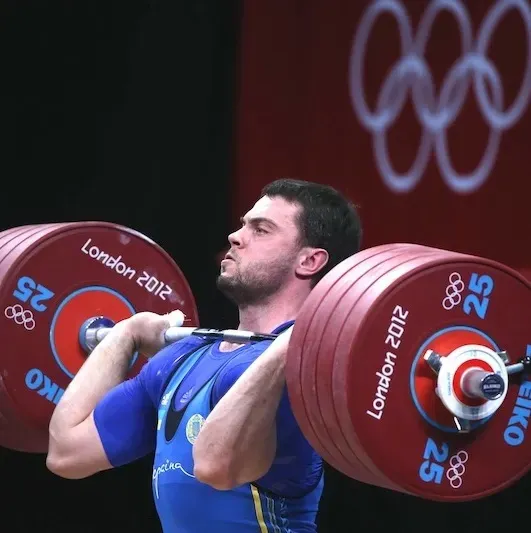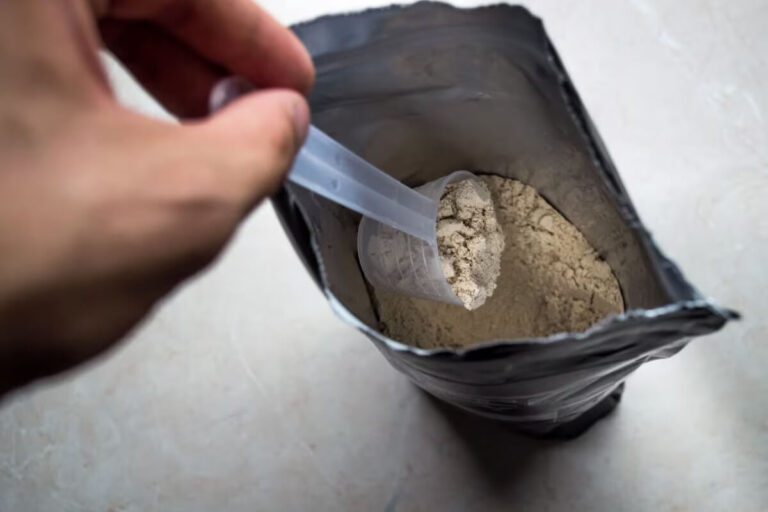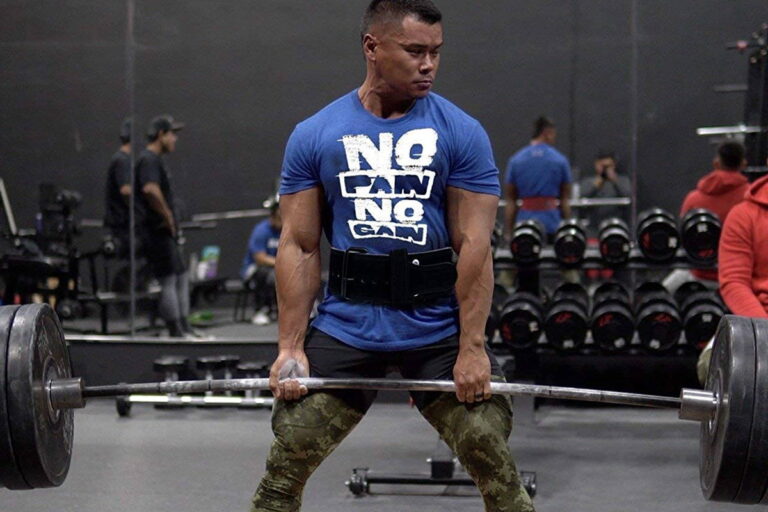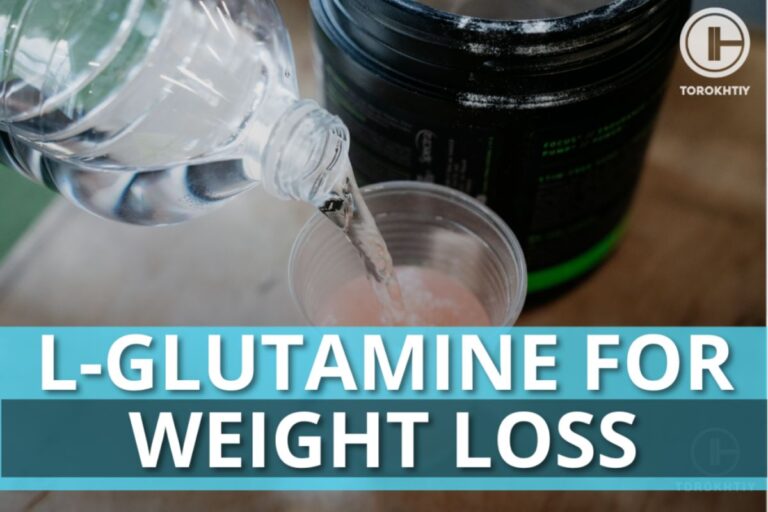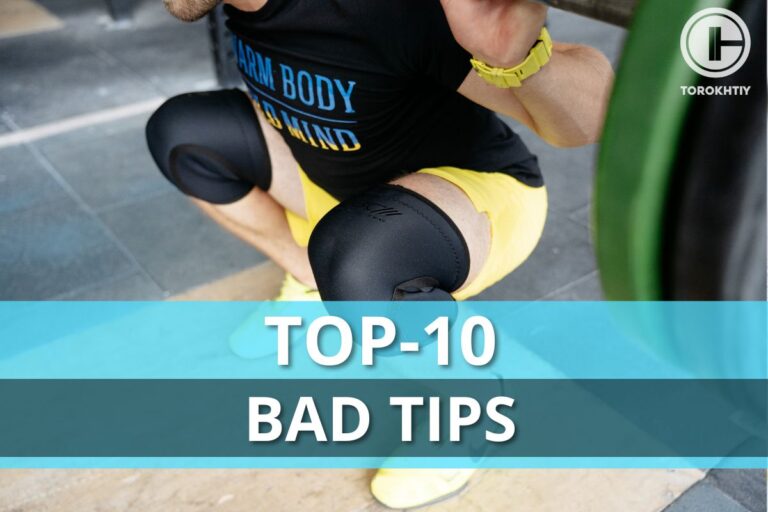How to Make Liquid Chalk
In this article, I cover what liquid chalk is made of, give a step-by-step guide on how to make your own at home and teach you how to store it correctly.
Liquid chalk is made from a 2:1 ratio of chalk to alcohol. To make homemade liquid chalk, grind dry chalk into a fine powder. Mix the powder with rubbing alcohol (70% alcohol content) in a 2:1 ratio until you get a toothpaste-like consistency. Add other ingredients for your own liquid chalk recipe.
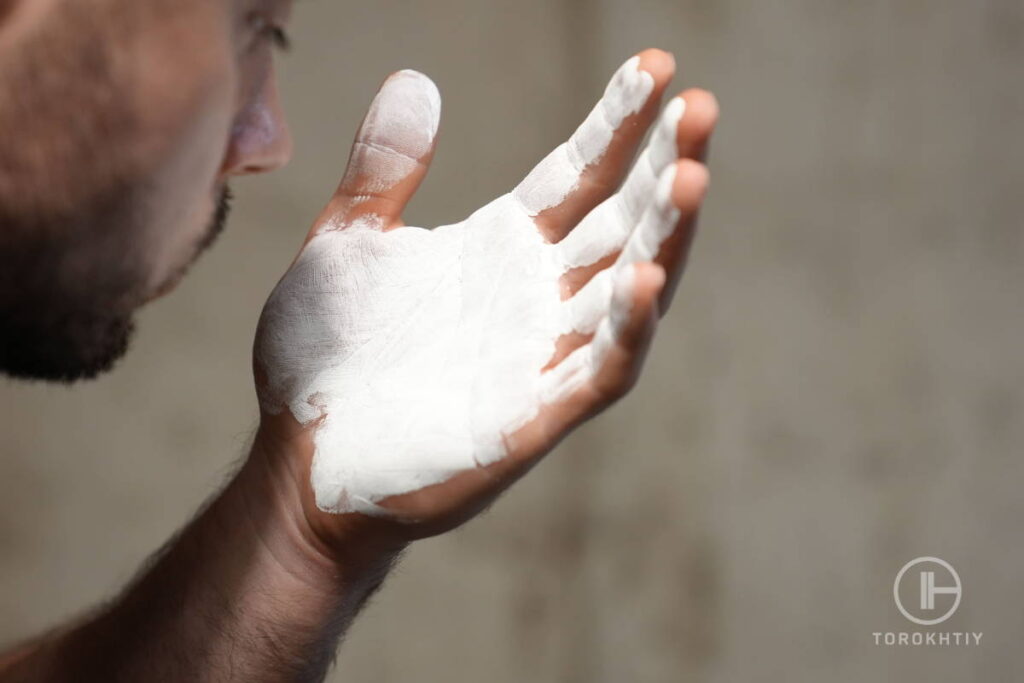
What is Liquid Chalk Made of?
Gym chalk has been a staple in gyms since the 1950s and even longer in climbing circles and gymnastics events. Step into any gym and you’re likely to see gym users of all levels sporting gym bags containing either dry or liquid chalk.
Liquid chalk has become increasingly popular over dry chalk as it dries quicker, lasts longer, and is mess-free. It’s becoming more common to make cheap, easy-to-use liquid chalk recipes at home.
The main ingredient in both dry and liquid chalk is magnesium carbonate. Liquid chalk is made by adding alcohol to the magnesium carbonate which gives it a wet, paste-like consistency.
The alcohol used is generally 40-80% proof, made of ethanol, methanol, or isopropanol. Other additives such as resin, honey, essential oils, or proprietary blends may be added depending on the manufacturer. This is usually done to try to make their brand of chalk stand out on the market.
Avoid using normal low percentage alcohol or ingredients which may make the chalk consistency too dry or lumpy and toxic ingredients such as artificial colors or heavy metals.
How to Make Liquid Chalk
Homemade liquid chalk is quick, cheap, and easy to make. Making your own means you can pick a brand of dry chalk you like and tweak the ingredients to make a DIY liquid chalk recipe.
Liquid Chalk Ingredients:
- Climbing chalk; block or loose powder
- Isopropyl or rubbing alcohol
- A bowl
- A spoon
- A measuring cup
- Airtight squeeze bottle or container
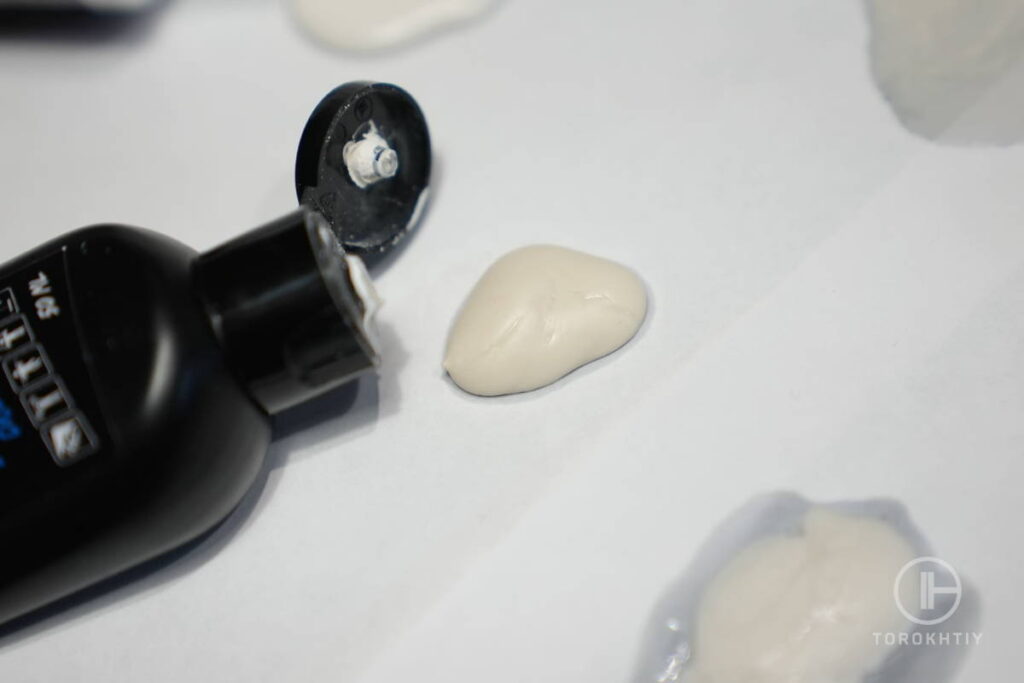
Using your favorite brand of dry chalk, follow this step-by-step guide to make a 2:1 ratio of chalk to alcohol.
Step 1: Grind dry chalk into a fine powder
- Take a large bowl and spoon or pestle and mortar. Grind the chalk into a fine powder. Make sure all the chalk is broken down into a fine powder.
- Alternatively use a plastic bag and rolling pin to smash the chalk into pieces.
- Use a fine mesh strainer if needed to check the chalk consistency.
Step 2: Mix the fine chalk powder and alcohol together
- Place the fine chalk powder into a bowl or container. Add the alcohol a little at a time, stirring constantly until you get a chalk paste. Aim for a 2:1 chalk-to-alcohol ratio.
- Make sure to use labeled isopropyl alcohol or rubbing alcohol with 70% alcohol content.
- Aim for a consistency similar to toothpaste or hand cream. Mix well to get a consistent solution, making sure not to leave any dry chalk in the bowl.
- More alcohol or water can be added if you prefer a thinner consistency.
- Add extra ingredients as desired to give the chalk different properties. Commonly added ingredients include resin, honey, and essential oils.
Step 3: Transfer liquid chalk to an airtight container
- Transfer the liquid mixture into an airtight bottle or container. Make sure the bottle or container is full.
- As the alcohol will evaporate over time, an airtight container will help your homemade product last longer.
How to Store Liquid Chalk
To help your chalk last longer, it should be stored in an airtight container or bottle and kept in a cool, dry place. Keep the chalk out of direct sunlight and hot temperatures which can cause the air in the bottle to expand.
Make sure the bottle cap or container top is completely closed when the chalk isn’t being used to prevent the liquid mixture from drying up.
DIY Chalk vs Online Store Chalk – Which one Should I Get?
If you don’t want to mess around with different ingredients at home learning how to make gym chalk, buying online is a great option. The chalks are formulated to suit your needs with the companies already spending the time perfecting the mix of ingredients. Liquid chalk is cheap, ready to go and convenient to buy. The options online offer many different types to cover a range of needs in the gym.
Liquid Chalk We Recommend
If you decide to buy chalk online, our best choice is the WARM BODY COLD MIND Liquid Chalk.

WARM BODY COLD MIND offers a mess-free, easy to use liquid chalk. It’s sweat resistant, long-lasting and dries fast once applied. It’s citrus scented, meaning you don’t get a strong alcohol smell when using it. The low alcohol percentage makes it a great choice if you have sensitive skin.
The bottle comes with a handy spare cap in case the old one gets blocked with dry chalk.
The liquid chalk is designed to improve grip for weightlifting, powerlifting, fitness, gymnastics and climbing.
FAQs
Is Liquid Chalk Messy?
Liquid chalk makes almost no mess. Apply a small amount of liquid to your palms, rub for a few seconds and let dry. Whilst a little chalk may transfer onto your clothes, it can easily be rubbed off.
What Alcohol Is in Liquid Chalk?
Liquid chalk contains 40-80% alcohol which is generally ethanol, methanol, or isopropanol. This is added with magnesium carbonate (chalk), water, and other additives such as resin or proprietary mixes, depending on the manufacturer.
Can You Make Liquid Chalk From Dry Chalk?
Yes, you can. Place crushed dry chalk into a container and add a little rubbing alcohol. Keep adding alcohol, stirring constantly until you get a chalky paste. The consistency should be similar to toothpaste. For thinner chalk add more alcohol.
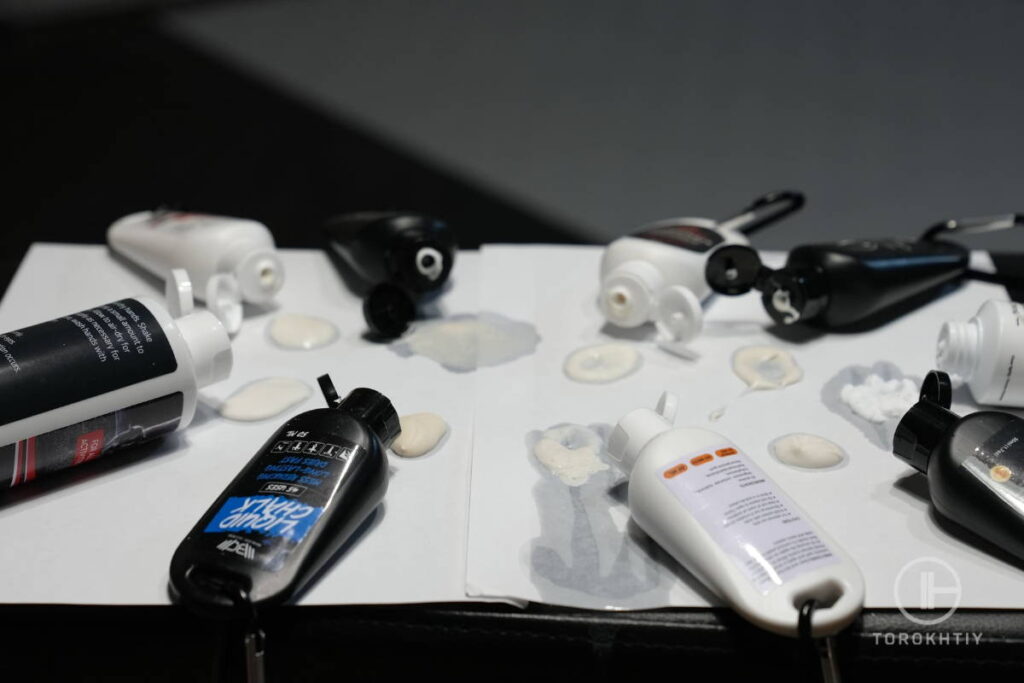
Summary
Liquid chalk is now hugely popular as a mess-free alternative to dry chalk in the gym, climbing circles, and gymnastic events. It’s made using a 2:1 ratio of dry chalk to alcohol.
Homemade liquid chalk is quick, easy, and cheap to make. Make sure it’s in an airtight bottle or container and stored in a cool, dry place to help the chalk last longer.
Have you made your own liquid chalk before? What are your favorite ingredients? Share your recipes and experiences in the comments.
References:
- Isopropyl Alcohol // Wikipedia:
https://en.wikipedia.org/wiki/Isopropyl_alcohol - Magnesium carbonate // Wikipedia:
https://en.wikipedia.org/wiki/Magnesium_carbonate
Why Trust Us?
With over 20 years in Olympic Weightlifting, our team does its best to provide the audience with ultimate support and meet the needs and requirements of advanced athletes and professional lifters, as well as people who strive to open new opportunities and develop their physical capabilities with us.
By trusting the recommendations of our certified experts in coaching, nutrition, dietology, and sports training programming, as well as scientific consultants, and physiotherapists, we provide you with thorough, well-considered, and scientifically proven content. All the information given in the articles concerning workout programming, separate exercises, and athletic performance, in general, is based on verified data. We ensure that you can rely on our professionals’ pieces of advice and recommendations that can be treated as personalized ones which will benefit you and fully meet your needs.
The product testing process is described in more detail here
Author: Oleksiy Torokhtiy
Olympic Weightlifting Champion
Best Results: Snatch – 200 kg,
C&J – 240 kg
Oleksiy Torokhtiy is a professional athlete boasting 20 years of experience in Olympic weightlifting. With multiple European and World titles under his belt, he has showcased his prowess in two Olympic Games (Beijing 2008 and London 2012). Upon concluding his illustrious career, Oleksiy dedicated himself to coaching. By 2022, he had conducted over 200 weightlifting seminars worldwide. He is the visionary behind an international sportswear and accessories brand known for its motto, “Warm Body Cold Mind.” Additionally, he is an esteemed author and the creator of a series of training programs and eBooks.

